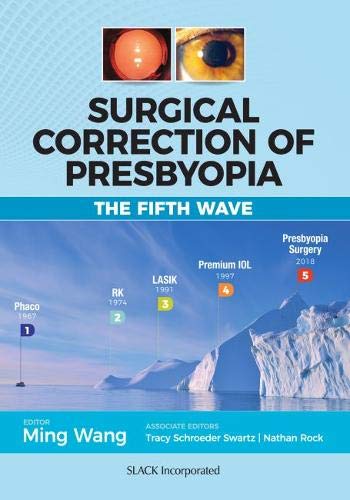Until recently, surgical correction of presbyopia was considered the “last frontier” in ophthalmology, but today there are a wide variety of treatments available. This Fifth Wave of ophthalmology opens up a whole world of surgical solutions for presbyopes who would otherwise have no recourse, and Surgical Correction of Presbyopia: The Fifth Wave is designed as a complete guide to the wide range of surgical solutions available.
Dr. Ming Wang is joined by Associate Editors Drs. Tracy Schroeder Swartz and Nathan Rock and their all-star team of expert contributors to compile the first comprehensive review of all the state-of-the-art surgical treatments for presbyopia. This includes a history of refractive and lens surgery, a review of presbyopia and its medical management, as well as in-depth sections on not only those surgical treatments that are currently available but also those under active clinical investigation.
Inside Surgical Correction of Presbyopia is a detailed presentation on corneal solutions, including laser treatments and corneal inlays; lenticular solutions, including intraocular lenses; and scleral solutions, such as scleral implants and ablation. Each procedure features a discussion on the indications, benefits, results and risks of the procedure with close attention to clinical applications. Also included are chapters on complex cases, which focus on improving outcomes both with patient and surgical modality selection and postoperative management.
Chapters include:
- Excimer and Femtosecond LASER for Treatment of Presbyopia
- Shape-Changing Inlays
- Multifocal Intraocular Lenses
- Extended Depth of Focus Intraocular Lenses
- Laser Scleral Microablation Procedure
- Marketing Surgical Treatment for Presbyopia
- The Future of Presbyopia Treatment
Presbyopia is the most common refractive condition and more patients and providers are actively seeking surgical solutions. With Surgical Correction of Presbyopia: The Fifth Wave, anyone from ophthalmology technicians and opticians to practicing ophthalmologists and optometrists will confidently understand and be prepared to tackle this “last frontier” of ophthalmology.

















